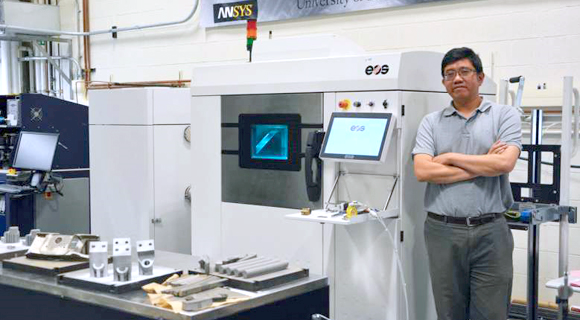US researchers pursue metal Additive Manufacturing for the nuclear industry
July 11, 2018

Albert To stands next to the EOS DMLS M290 in the Swanson School’s ANSYS Additive Manufacturing Research Lab (Courtesy Swanson School of Engineering)
A team of researchers at the University of Pittsburgh’s Swanson School of Engineering, Pennsylvania, USA, has been granted $1 million by the U.S. Department of Energy (DoE) Office of Nuclear Energy’s Nuclear Energy Enabling Technologies (NEET) programme to pursue the development of cost-effective metal Additive Manufacturing processes for the production of nuclear plant components. Because the removal of support structures from metal AM parts can be an expensive step in the process, the technology has to date struggled to find application in the nuclear industry, which relies on cost-effective manufacturing of complex components.
The research team will be led by project director Albert To, Associate Professor of Mechanical Engineering and Materials Science (MEMS) at the Swanson School. Co-investigators include Wei Xiong, Assistant Professor of MEMS at the University of Pittsburgh, and Owen Hildreth, Assistant Professor of Mechanical Engineering at the Colorado School of Mines. Corporate collaborators in Pittsburgh include Curtiss-Wright Corporation and Jason Goldsmith at Kennametal Inc.
The team stated that the primary goal of its research will be to develop dissolvable supports, more effective topology optimisation and improved part microstructure. If successful, this has the potential to enable the production of complex nuclear components at lower cost, with minimal distortion and greater structural integrity.
“Many gaps still remain in the scientific understanding of Additive Manufacturing, most especially the optimisation of the assembly process while reducing build failure and cost,” explained To and Xiong. “Removing internal support structures in complex additively manufactured components via post-machining is costly and sometimes impossible. By integrating dissolvable supports, topology optimisation, microstructure design, we have an opportunity to drastically reduce post-processing costs for AM components, while ensuring manufacturability of designs with complex internal features like those needed in the nuclear industry.”
According to Hildreth, post-processing accounts for 30–70% of the cost of making metal AM parts, with support removal accounting for the majority of those costs. “Our dissolvable support technology enables consolidation of the many manufacturing steps currently required for complex nuclear components into one AM assembly. This will reduce manufacturing costs by 20% and improve manufacturing schedules by at least six months,” he stated, adding that, “this work will help bring dissolvable supports to not just nuclear applications, but to the broader metal AM community so that costs can be significantly reduced. Metal AM is projected to be a $21.2 billion industry in five years, and these batch-processable dissolvable supports could save the industry $10 billion while also expanding design freedom and reducing post-processing machining.”
The award granted to the Pittsburgh research team is one of five NEET Crosscutting Technologies projects set to be led by DoE national laboratories, industry and universities in the US to conduct research to address crosscutting nuclear energy challenges. These linked projects aim to develop advanced sensors and instrumentation, advanced manufacturing methods and materials for multiple nuclear reactor plant and fuel applications.
Ed McGinnis, the DoE’s Principal Deputy Assistant Secretary for Nuclear Energy, commented, “Because nuclear energy is such a vital part of our nation’s energy portfolio, these investments are necessary to ensuring that future generations of Americans will continue to benefit from safe, clean, reliable and resilient nuclear energy. Our commitment to providing researchers with access to the fundamental infrastructure and capabilities needed to develop advanced nuclear technologies is critical.”
















